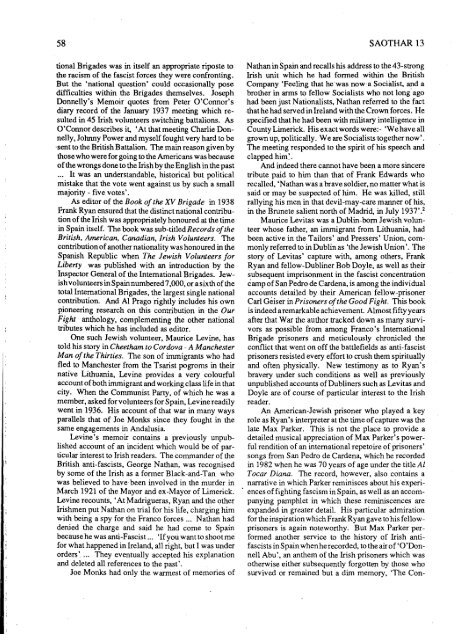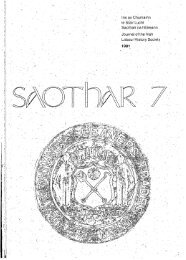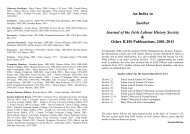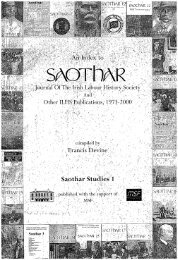58SAOTHAR 13tional Brigades was in itself an appropriate riposte tothe racism of the fascist forces they were confronting.But the 'national question' could occasionally posedifficulties within the Brigades themselves. JosephDonnelly's Memoir quotes from Peter O'Connor'sdiary record of the January 1937 meeting which resultedin 45 Irish volunteers switching battalions. AsO'Connor describes it, 'At that meeting Charlie Donnelly,Johnny Power and myself fought very hard to be'sent to the British Battalion. The main reason given bythose who were for going to the Americans was becauseof the wrongs done to the Irish by the English in the past... It was an understandable, historical but politicalmistake that the vote went against us by such a smallmajority - five votes'.As editor of the Book of the XV Brigade in 1938Frank Ryan ensured that the distinct national contributionof the Irish was appropriately honoured at the timein Spain itself. The book was sub-titled Records of theBritish, American, Canadian, Irish Volunteers. Thecontribution of another nationality was honoured in theSpanish Republic when The Jewish Volunteers forLiberty was published with an introduction by theInspector General of the International Brigades. Jewishvolunteers in Spain numbered 7,000, or a sixth of thetotal International Brigades, the largest single nationalcontribution. And Al Prago rightly includes his ownpioneering research on this contribution in the OurFight anthology, complementing the other nationaltributes which he has included as editor.One such Jewish volunteer, Maurice Levine, hastold his story in Cheetham to Cordova - A ManchesterMan of the Thirties. The son of immigrants who hadfled to Manchester from the Tsarist pogroms in theirnative Lithuania, Levine provides a very colourfulaccount of both immigrant and working class life in thatcity. When the Communist Party, of which he was amember, asked for volunteers for Spain, Levine readilywent in 1936. His account of that war in many waysparallels that of Joe Monks since they fought in thesame engagements in Andalusia.Levine's memoir contains a previously unpublishedaccount of an incident which would be of particularinterest to Irish readers. The commander of theBritish anti-fascists, George Nathan, was recognisedby some of the Irish as a former Black-and-Tan whowas believed to have been involved in the murder inMarch 1921 of the Mayor and ex-Mayor of Limerick.Levine recounts, 'At Madrigueras, Ryan and the otherIrishmen put Nathan on trial for his life, charging himwith being a spy for the Franco forces ... Nathan haddenied the charge and said he had come to Spainbecause he was anti-Fascist ... 'If you want to shoot mefor what happened in Ireland, all right, but I was underorders', ... They eventually accepted his explanationand deleted all references to the past'.Jce Monks had only the warmest of memories ofN athan in Spain and recalls his address to the 43-strongIrish unit which he had formed within the BritishCompany 'Feeling that he was now a Socialist, and abrother in arms to fellow Socialists who not long' agohad been just Nationalists, Nathan referred to the fact.that he had served in Ireland with the Crown forces. Hespecified that he had been with military intelligence inCounty Limerick. His exact words were:- 'We have allgrown up, politically . We are Socialists together now' .The meeting responded to the spirit of his speech andclapped him' .And indeed there cannot have been a more sinceretribute paid to him than that of Frank Edwards whorecalled, 'Nathan was a brave soldier, no matter what issaid or may be suspected of him. He was killed, stillrallying his men in that devil-may-care manner of his,in the Brunete salient north of Madrid, in July 1937'.2Maurice Levitas was a Dublin-born Jewish volunteerwhose father, an immigrant from Lithuania, hadbeen active in the Tailors' and Pressers' Union, commonlyreferred to in Dublin as 'the Jewish Union'. Thestory of Levitas' capture with, among others, FrankRyan and fellow-Dubliner Bob Doyle, as well as theirsubsequent imprisonment in the fascist concentrationcamp of San Pedro de Cardena, is among the individualaccounts detailed by their American fellow-prisonerCarl Geiser in Prisoners of the Good Fight. This bookis indeed a remarkable achievement. Almost fifty yearsafter that War the author tracked down as many survivorsas possible from among Franco's InternationalBrigade prisoners and meticulously chronicled theconflict that went on off the battlefields as anti-fascistprisoners resisted every effort to crush them spirituallyand often physically. New testimony as to Ryan'sbravery under such conditions as well as previouslyunpublished accounts of Dubliners such as Levitas andDoyle are of course of particular interest to the Irishreader.An American-Jewish prisoner who played a keyrole as Ryan's interpreter at the time of capture was thelate Max Parker. This is not the place to provide adetailed musical appreciation of Max Parker's powerfulrendition of an international repetoire of prisoners'songs from San Pedro de Cardena, which he recordedin 1982 when he was 70 years of age under the title AlTocar Diana. The record, however, also contains anarrative in which Parker reminisces about his experi-. ences of fighting fascism in Spain, as well as an accompanyingpamphlet in which these reminiscences areexpanded in greater detail. His particular admirationfor the inspiration which Frank Ryan gave to his fellowprisonersis again noteworthy. But Max Parker performedanother service to the history of Irish antifascistsin Spain when he recorded, to the air of 'O'Donnel!Abu~, an anthem of the Irish prisoners which wasotherwise either subsequently forgotten by those whosurvived or remained but a dim memory, 'The Con·
REVIEWSnolly-Column Song','Proudly we're marching, proudly we're singingThe song of our country we all hold so dearFar from our native land, proudly we take our standWe're members of the International Brigades.Think of the guns we bear, think of the clothes wewearThink of the insults endured in thy nameTempered by the sun of Spain, hardened by thewind and rainWe're members of the International Brigades.'3NotesManus O'Riordan1. Michael O'Riordan, The Con.n.olly Column, (NewBooks, Dublin, 1979). .2. UinseannMacEoin (ed), Survivors, (Dublin, 1980),p 13. .3. I am grateful toMary Parker, widow of Ma x Parker,for permission to quote the Connolly Column song.(Mary Parker's parents hailed from Oughterard,Co. Galway.) No Connolly Column veteran I'vespoken to could remember the song any more!Ronnie Munck and Bill Rolston, Belfast In the ThIrties:An Oral History, (BlackstaffPress, Belfast, 1987),pp. 209,£9.95The 1798 Rebellion and the 1932 Outdoor ReliefStrike have a special symbolic significance for manyIrish radicals. Both have been used as evidence thatProtestants and Catholics can transcend sectarian divisions,and unite against injustice. In recent years,however, some historians - mostly Unionist - haveargued that the unity of the 1790s was spurious, onlybriefly and partially masking ongoing sectarian conflict.One of the aims of the book reviewed here is tosimilarly deromanticise the 1932 strike, but this timefrom a leftist point of view. .The authors state their po si tion clearly. They arguethat in recent history there have been two major forcesoperating in working class life in Belfast; sectarianismand socialism. These do not necessarily cancel oneanother out. The apparent paradox, that the unity of the1932 strike was followed in 1935 by some of the worstsectarian violence seen in Belfast, is overcome whenwe realise that neither was an isolated occurrence.Socialism and sectarianism operated in Belfast beforeand after the 1930s. The upsurge of popular protest in1932 meant that for a time sectarianism was 'quiescent',but there is no need to postulate a sudden break-through in Belfast working-class consciousness. Forthe authors, the events of the 1930s are directly relevantto a central question for the Irish left. Can socialism beachieved and sectarianism obliterated before the nationalquestion it settled? Rolston and Munck, whodescribe their book in the concluding chapter as a'study of republicanism', make their own position veryclear. This will rouse strong passions in many readers,but whatever one feels about the position, their at timesalmost polemical statemeiIt of it makes a refreshingchange from historical works which pretend at empiricalobjectivity.AlI'of this would be sufficient to make the bOok asubject of debate. However, the bulk of the text dealswith working class life in the 1930s. Chapters dealingwith unemployment, poverty, and working'conditionsprecede a discussion of organised labour and republicanmovements in the city. Outlining the data presentedcould completely fill this review and createalmost as many arguments as the central theme. (Werethere 1,000 communists in Belfast during the 1930s asBetty Sinclair claimed, or fifty, a more accurate figureaccording to the authors?). Discussing the historicalcontent, however, would preclude consideration ofanother of the book's most important aspects - the oralhistory method used.. Labour historians have been attracted to oral historybecause of its potential to provide access to theexperience of the mass of working class people, whopreviously were anonymous. Many conventional historians,however, dismiss the method as, in A.I.P.Taylor's words, 'old men drooling about their youth'.Munck and Rolston strongly defend oral history, whiletaking major criticisms of the method into' account.They carefully describe how the fifty people interviewedwere chosen, and how interviews were conducted.They also describe how they cross-checkeddata with contemporary writings, and other oral sources.A frequent charge made against oral history is thatit is bound to be simply anecdotal. This is not how it isused in this book. Some sections, such as the generalsurvey of unemployment, or the description of sectarianattacks in 1935, are based largely on documentarysources, and oral tes timony is used to enrich the data, orto provide examples. Buteven in these sections the oralevidence is vital. Accounts such as the one describinga young Catholic couple's desperate and futile attemptto escape from a sectarian mob drive home the obscenityof this kind of atrocity more forcefully than statisticsof burnings or killings ever could.The method really comes into its own, however, inareas where it is the only possible historical source.Some of the most impressive sections of the book dealwith the variety of ways in which families tried to makeends meet, the position of women in working classfamilies, and the ways in which people heard aboutwork, or used patronage to get it. The detailed descrip-59
- Page 1 and 2:
JOURNAL OF THE IRISH LABOUR HISTORY
- Page 3 and 4:
ContentsPageEditorial: Labour Histo
- Page 5 and 6:
EDITORIAL 3freedom to participate i
- Page 7 and 8:
CorrespondenceThe Irish Labour Part
- Page 9 and 10: ; ~ ; ,The Decline and Fall of Donn
- Page 11 and 12: THE DECLINE AND FALL OF DONNYBROOK
- Page 13 and 14: THE DECLINE AND FALL OF DONNYBROOK
- Page 15 and 16: ·' THE DECLINE AND FALL OF DONNYBR
- Page 17 and 18: THE DECLINE AND FALL OF DONNYBROOK
- Page 19 and 20: THE DECLINE AND FALL OF DONNYBROOK
- Page 21 and 22: THE DECLINE AND FALL OF DONNYBROOK
- Page 23 and 24: THE DECLINE AND FALL OF DONNYBROOK
- Page 25 and 26: ,'-,;-''''.A PASSAGE TO BRITAIN 23C
- Page 27 and 28: A PASSAGE TO BRITAIN 25only in the
- Page 29 and 30: A PASSAGE TO BRITAIN 27clothing._De
- Page 31 and 32: A PASSAGE TO BRITAIN 29established
- Page 33 and 34: ;:-.",.- .. .", ...... '.:. '
- Page 35 and 36: LOUIE BENNETI 33feminist movement w
- Page 37 and 38: :... ~: ."
- Page 39 and 40: -.- '.LOUlE BENNETT 37While there i
- Page 41 and 42: LOUIE ~ENNEIT 39Xl's encyclical Qua
- Page 43 and 44: LOUIE BENNEIT 41Bennett's own relat
- Page 45 and 46: LODIE BENNETT 43109; IWWU resolutio
- Page 47 and 48: Essays in ReviewCosherers, Wanderer
- Page 49 and 50: ••• .".'. >. '~"ESSA YS IN RE
- Page 51 and 52: ESSAYS IN REVIEW 49ConnolIy:Myth an
- Page 53 and 54: ESSAYS IN ~EVIEW 51tion' in the Int
- Page 55 and 56: ESSAYS IN REVIEW53International:'I
- Page 57 and 58: REVIEWScontroversy is real history.
- Page 59: REVIEWSJoe Monks was among the earl
- Page 63 and 64: REVIEWSresulting from the arrival o
- Page 65 and 66: REVIEWS,63the book by means of an a
- Page 67 and 68: REVIEWSlogue, it is hardly surprisi
- Page 69 and 70: The Team For All Workers ...CULIAIB
- Page 71 and 72: ESSAYS 69mission and moral refonn.l
- Page 73 and 74: .. ...... ~.~ -~ .'- '.ESSAYS. 71fr
- Page 75 and 76: ESSAYS 73claimed authority but whic
- Page 77 and 78: ESSAYS 75provided the basis for soc
- Page 79 and 80: ESSAYS 779. For comparisons see E.T
- Page 81 and 82: ESSAYS 7952. Annals of Christ Churc
- Page 83 and 84: ESSAYS' 81Fianna Fail and the Worki
- Page 85 and 86: ESSAYS 83Eireann in 1925 visibly di
- Page 87 and 88: ESSAYS 85recognition of the impract
- Page 89 and 90: ESSAYS 871970, it created the condi
- Page 91 and 92: ESSAYS89The Irish Immigrants' Contr
- Page 93 and 94: ESSAYS" 91Although anti -Catholic p
- Page 95 and 96: ESSAYS 93McCowie played a key role
- Page 97 and 98: :. -,,'.' ',. .~.,:.ESSAYS 95Althou
- Page 99 and 100: ESSAYS 97young girl of their own ba
- Page 101 and 102: SourcesIrish Labour History Society
- Page 103 and 104: SOURCES 101INovember, 1971 to no. 1
- Page 105 and 106: SOURCES 103would claim credit for t
- Page 107 and 108: SOURCES105Sources for Irish Labour
- Page 109 and 110: SOURCES 107NorthWest Archives and L
- Page 111 and 112:
SOURCES 109In 1966 the Finnish gove
- Page 113 and 114:
TURNINGANEWLEAFThe CPSSUis the larg
- Page 115 and 116:
REMINISCENCE 113us due to my politi
- Page 117 and 118:
REMINISCENCE 115when Jim was presen
- Page 119 and 120:
REMINISCENCE 117of Dail Eireann. 17
- Page 121 and 122:
REMINISCENCE 119NotesThe above arti
- Page 123 and 124:
DOCUMENT STUDY 121James Connolly in
- Page 125 and 126:
DOCUMENT STUDY123SOCIAL DEMOCRATIC
- Page 127 and 128:
DOCUMENT STUDY 125proletariat of th
- Page 129 and 130:
DOCUMENT STUDY 127the support of Je
- Page 131 and 132:
DOCUMENT STUDY 12926. The Workers'
- Page 133 and 134:
131BibliographyA Bibliography of Ir
- Page 135 and 136:
BIBLIOGRAPHY 133Compton, P.A. Demog
- Page 137 and 138:
BIBLIOGRAPHY 135Levine, I. and Madd
- Page 139 and 140:
BIBLIOGRAPHY 137Turner, M. 'Towards
- Page 141 and 142:
BIBLIOGRAPHY 1394. Land and Agricul
- Page 143 and 144:
BIBLIOGRAPHY 141Clogher Record12 (2
- Page 145 and 146:
BIBLIOGRAPHY 143Political Research
- Page 147 and 148:
BIBLIOGRAPHY 145Pres, 1987.O'Brien,
- Page 149 and 150:
147Notes on Contributorsf onathanBe
- Page 151 and 152:
1901: Ireland's first general union
- Page 153 and 154:
ELECTRICAL TRADES UNION .Establishe





